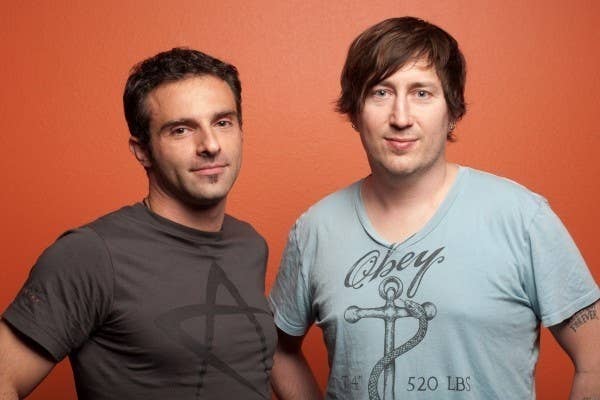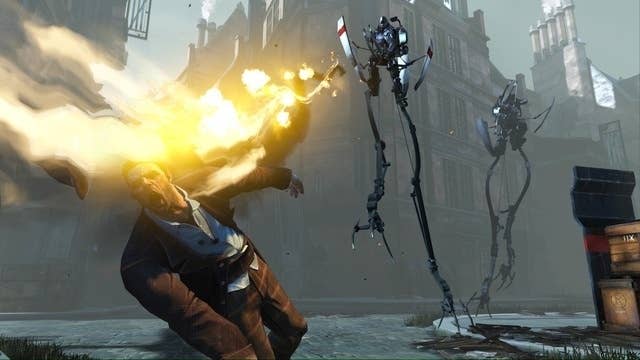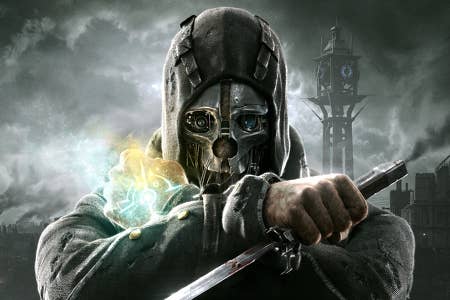Dishonored: No Marines, No Elves, No Bank Heists
Arkane's Harvey Smith on launching new IP, the rejection of cinematic action, and why Minecraft is just like The Beatles
Another gameplay demo, another group of happy journalists. The crowded halls of Gamescom aren't always full of smiling faces, but there are always a few pockets of unbridled enthusiasm. This year, Arkane Studios' Dishonored is the game drawing the most goodwill, and I'm sitting in the very best spot to judge its impact: outside the demo room, watching the critics wearily walk-in and then excitedly leave, revitalised by the promise of what Arkane has created.
What that means for its sales is hard to judge. Launching an original and challenging IP so late in the console cycle tends to terrify the very publishers with the resources to make it happen, and Dishonored's deep simulation gameplay is a comfortable step to the side of mainstream tastes. Frankly, it's a hard sell for the increasingly conservative AAA market, but the wave of admiration following E3 and now Gamescom indicates that Arkane and its publisher, Bethesda, have made the right calls - much to co-director Harvey Smith's delight, and relief.
"I remember working at companies where people would tell me that role-playing games don't sell," Smith says, as bright and talkative as one can reasonably expect from someone preparing for a full day of back-to-back interviews. "I once had an executive tell me that first-person games don't sell. It can fly in the face of reality.
"At a certain point I came to mistrust formulas, because I've seen so many examples of people failing or succeeding by following a certain blueprint"
"By contrast, look at companies that believe in the creative vision of the people running the project, and you end up with a Fallout 3 or a Skyrim - incredibly deep, incredibly wide, nerdy in a way, but also incredibly popular."
Smith is a true veteran, with experience of both the highs and lows of the games industry. Justifiably admired for his work as lead designer of Deus Ex at Ion Storm Austin, Smith's subsequent career didn't reached those heights again. Deus Ex: Invisible War drew a mixed response from the series' devoted followers, and his three-year tenure as creative director of Midway Austin bore only the compromised shooter Blacksite: Area 51. For someone with such clear ideas about game design, Smith has often struggled to express them.
"We're not just game developers," Smith says, referring to Arkane's Raphael Colantonio, co-director of Dishonored. "We're very specialised in this one type of game, and we've become accustomed to the hardcore people loving it and nobody else paying attention. Dishonored is different, somehow. Deus Ex, for me and the guys that worked in it, was like that. Bioshock was like that for Irrational. It's very gratifying.
"I think you could say that, as developers, we've become a little more sophisticated at staying true to what we want to do, but also communicating to consumers what's special about that. Dishonored's setting, the city of Dunwall, is this alt-Victorian, alt-industrial revolution thing, and there are ways to showcase it that make it appealing. Another thing that helps is we're working with the best art team ever, and the whole game looks like a moving painting. I don't have anything to do with that - that's all Sebastian [Mitton, art director], and all Viktor Antonov [visual design director]."

Indeed, Viktor Antonov's decision to join Dishonored was a minor milestone in creating discussion around the project. While at Valve, Antonov oversaw the creation of Half-Life 2's brilliant City 17, and his arrival at Arkane seemed to offer visual expertise to counterbalance to Smith and Colantonio's laser focus on gameplay systems and level design. Arkane, he recently said, approached development like, "jazz, jamming or rock 'n' roll, where it's small, it's intense, and it's about making revolutions in the media."
Ultimately, Smith believes that the culture Antonov describes is the driving force behind the interest Dishonored has created. In the context of late-cycle console development, when Army of Two: The Devil's Carttel is considered a safer bet than a new idea, standing out can be a far wiser strategy than fitting in.
"You could attribute it to gamer fatigue. How many games have been released now where you're a soldier, or a space marine, or you're surrounded by elves and wizards, or you're robbing a bank in L.A.? I'm still an optimist, and I still have a great time playing games, but the truth is I play two AAA games a year, I probably really enjoy two indie games a year, maybe a couple of mobile games a year, because most stuff is just variations on things we've seen before. If you've been around a while you've seen it over and over and over."
Smith claims that 99 per cent of the industry's output on any given year doesn't hold his interest, from console and PC all the way to indie and mobile games. But a handful of times in each year "something special" emerges: a Skyrim, a Bioshock or a Far Cry 2, games that empower the player and reward experimentation. With Dishonored, Arkane is making a clear play to be 2012's "something special," a game that Smith would happily play even if his name weren't on the back of the box.
"We've become accustomed to nobody else paying attention. Dishonored is different. Deus Ex was like that. Bioshock was like that for Irrational. It's very gratifying"
"We think about the player experience we want and we go for that - not a cinematic experience, but an interactive experience," he says. "[If] you're following a trail of breadcrumbs left by the designer it's the same experience every time, and two different people will have exactly the same experience. The goal is cinematic action, which is a terrible goal for games. Really, if you're making a game the goal should be improvisation.
"There are many ways to be successful. You could go out and aim for a very mainstream story, make it look like a Hollywood adventure movie, have the best dialogue and voice-acting ever, and the smoothest animations ever, and put this likeable American male in a variety of epic situations - hanging from a train, or whatever - and you can capture an audience that way and be very successful. I mean, I didn't like that particular game, but all of my friends did.
"On the other hand, you can be completely rock 'n' roll about it and say, 'Fuck it, we're gonna do everything different from everyone else. We're driven by this one impulse creatively.' You can be successful, or fail, either of those ways. At a certain point, I came to mistrust formulas, because I've seen so many examples of people failing or succeeding by following a certain blueprint.
"I haven't always been successful with the types of games I want to make...but Bethesda has had great success with following the creative vision of teams. It's the right combination at the right time. It could have turned out every differently."
Experiences like Dishonored, which are built on player agency and emergent gameplay, are notoriously difficult to showcase for the media and the public. The number of available options and complicating factors eliminate the possibility of a clean vertical slice, leaving it to developers like Arkane to pithily convey the broad potential without confusing the audience. It can easily go wrong, and, according to Smith, very often does.

Smith encountered the problem on Deus Ex and its sequel, and Colantonio struggled against it on Arx Fatalis and Dark Messiah of Might & Magic. If you're dealing with Rock Paper Shotgun it's clear that the journalist is willing, even eager, to imagine the possibilities, but that isn't true of every publication, and strong word-of-mouth is vital to a game like Dishonored finding success.
"If you show a sequence where somebody is on a motorcycle flying 90mph down the highway, and explosions are going off and helicopters are shooting at them, most of that will be non-interactive. There's not much you can do but keep going down this narrow, linear path, but people respond to that... It gets to your lizard brain."
When discussing their position in relation to the bulk of the industry, designers of Smith's sensibility run the constant risk of sounding like zealots, condemning all games that don't conform to their rigid standards. That, Smith assures me, is not the case here; there's nothing wrong with a good rollercoaster ride, and the industry producing a greater diversity of product will ultimately benefit everyone. But for a few years after the turn of the millennium the "dogmatic" approach of the publishers seemed to favour the cinematic to the exclusion of everything else, and particularly the demanding, reactive games that Smith wanted to make.
"I believe Minecraft is The Beatles to the current generation of kids. They want to tear the universe apart block-by-block"
Today, things are different: EVE Online is the most emergent MMO on the market, and the only one apart from World of Warcraft to create a thriving subscription business; Minecraft went from indie success to a multi-million, multi-platform behemoth without any assistance from publishers; And Day Z, an obscure mod for an obscure game from a lone developer, became one of the most discussed games in the world.
"My friend Clint Hocking, who worked on Far Cry 2, was worried at a point that we were going to market with these games that are highly interactive, and other people were going to market with games that are highly scripted and cinematic, and wouldn't it be terrible if the scripted games always won out?" Smith says.
"Wouldn't that evolutionarily take the business in a direction that was less healthy... There might be a point of no return.
"But some of the most popular experiences in the world today are multiplayer death-match modes where every entity in the world is a human making decisions. Or Minecraft, where every square foot of the world is interactive. I've watched kids play Minecraft, and I believe Minecraft is The Beatles to the current generation of kids. They don't want the scripted cinematic experience; they want to tear the universe apart block-by-block.
"It turns out that all of those turn-of-the-millennium executives in videogames were wrong."









